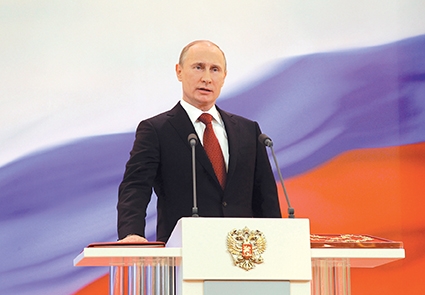Putin’s Monumental Task: Derailing the Western Expansion
Op-Ed
On May 7, Putin was sworn in as Russia’s President, which will his fourth presidential term, extending his rule beyond the psychological mark of 18 years – the longest since the Stalin epoch.
Putin enters his six-year term with numerous headaches over internal and foreign policy issues. Overall, Putin’s fourth term can be expected to be characterized by the challenge of an invigorated and united western front. Russian geopolitical influence in Ukraine, Georgia, and Moldova has diminished over the past decade. Western encroachment on what was always considered a Russian sphere of influence has reached new levels, unimaginable at the time of the Soviet break-up in the early 1990s. Russia’s entire western frontier (except for Belarus) is now under Western influence.
To start, Putin’s primary focus will be Ukraine. The country is an underbelly to the Russian domination over Eurasia. One should not forget the importance of this country to Moscow. In the Russian mindset, Ukraine is part of the Russian world, an integral part of the Slavic world and what’s more, it is important economically for Moscow. Without Ukraine, Russia is far too detached from the core of the European continent. Nowadays, Russia is rather more “in Asia” than Europe, and this bothers the Russian political elites primarily not because of the fear of becoming Asia-oriented, but because Moscow might lose its foundational influence in eastern Europe.
To Putin’s credit, the task he faces is indeed monumental. His predecessors from the Soviet as well as Russia’s imperial times fought with various European monarchs, but they never faced a unified Europe in the long run. In fact, what Russia faced was a fundamentally divided Europe where Russia could always have been a part of the settlement. Nowadays, Putin can only envy those times as Europe marches towards the East. Sure, there are huge problems with the EU enlargement and Ukraine, Georgia and Moldova have seen only a part of the benefits they were expecting. Nevertheless, it can be argued that Europe will not be easily defeated in its plans on expansion. Europe and its powerhouse, Germany, needs new markets, and Ukraine represents a large unchartered pool.
Never in history has Russia’s hold on its former territories and in eastern Europe been so fundamentally challenged. Local elites as well as economies are now increasingly connected to Europe or third countries such as China, Turkey, and Azerbaijan.
This creates the fundamental tension around Ukraine and Russia’s future ability to project its power. It was largely because of the loss of the Ukrainian market that the nascent Eurasian Economic Union for the moment lacks momentum. Among all the problematic issues accumulated between Moscow and the western powers, Ukraine will be of primary focus. Russia will have to make a decision. Dragging-on with the issue will not help as the EU will work further to solidify its positions in the former Soviet space.
In addition, the US, too, is ratcheting up pressure on Russia by providing military cooperation and general diplomatic and economic support to Ukraine and Georgia (and, to a lesser extent, Moldova). The battle for the former Soviet states will play an important role in Russian politics over the next few years.
Beyond Ukraine, Putin will also face three major foreign policy questions in his new term: 1) finalizing a settlement in Syria; 2) reaching a consensus with Japan over the Kuril Islands. Still, as outlined above, these questions are likely to be overshadowed by Russia’s fundamental problem positioned in and around Ukraine.
To these large foreign problems will be added internal challenges. Among them, the economy is a top priority. Putin does not face strong opposition and this is unlikely to happen unless a radical worsening of the economic situation takes place across the country. And this is important, as the Russian economy, as projected, will see very little, if any, improvement. As a confirmation, recent statistics showed that the Russian defense budget was cut by almost 20% for the first time over the last two decades. Considering how prioritized this section of financing was for Russia, and for Putin personally, the cut signals significant economic problems in the country.
By Emil Avdaliani












